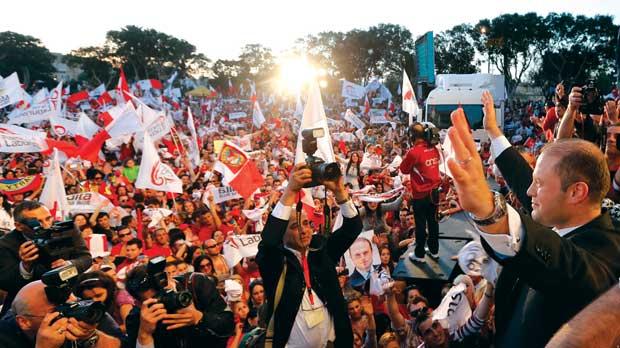Pieter Omtzigt’s mandate launched and renewed after the killing of Daphne Caruana Galizia, now expires. The government of Malta has managed to sit tight and wait out his assiduous insistence that Malta needs serious reforms if it is to climb out of the pit of horrors where the killing of a journalist uncovering the government’s corruption made perverse sense.
Watch this concluding statement by Pieter Omtzigt where he sums up his findings:
This should have been an opportunity for serious change for this country, a transition to a renewed, more mature democracy. Instead, Joseph Muscat moved from running the country from Castille to running the country from Burmarrad, dragging us further back into baronial antiquity.
The government has refused to discuss with any seriousness parliamentary reform because it is convenient from its point of view not to have a parliament in the functional sense. The structures to fight corruption remain weak and ineffective. The government’s retort, repeated with a flourish by Joseph Muscat last week, was that they removed the statute of limitations on corruption by politicians. But there’s still no proper way of investigating and prosecuting crimes of corruption so everybody is safe anyway.
The criminal justice system is a mess. We’re the only ones not to see this, apparently. The fact that three years after she was killed, nobody – not even people who have been in detention for most of those three years – has yet been tried by a jury for killing Daphne Caruana Galizia.
We have a system that is unable to fight organised crime because it is considerably less organised. We’re being played by Yorgen Fenech and the politicians that would be irreparably harmed by the association with him have a stake in his acquittal.
Magisterial inquiries remain the refuge for criminals and law enforcement agencies unwilling or unable to chase them. Practically alone, with close to no training, with meagre, casual and disparate resources, whilst conducting several other activities, magistrates take years to “compile evidence” in criminal cases and they mostly do that from inside their offices. Maybe I’ve watched too many police procedurals but this feels like the worst way of fighting crime. In complex cases of corruption and cross border crime, their lack of focus tells.
And the process of the police and the prosecutors deciding whether the magistrate has done enough to help them secure convictions only starts when the magistrate is done with his “work”, years and years after the fact. If we weren’t so bloody familiar with this, we’d call it banana republic stuff.
Pieter Omtzigt says the only thing that really worked was the Daphne Caruana Galizia public inquiry. No wonder the government wants it to stop. It is the only institution – because it has become that – that could cause the Labour Party minor annoyance and they want to swat it like a fly.
The Council of Europe’s rapporteur’s score-sheet says that the implementation of rule of law measures has been “unsatisfactory overall, with mixed results”. A far cry from the glowing praise Edward Zammit Lewis gave himself as if he was admiring his naked body in the mirror whilst picturing someone else.
The implementation to end impunity for high-level corruption has been “entirely unsatisfactory, with no concrete results”.
And the implementation of the measures to secure justice for Daphne Caruana Galizia has been “fundamentally unsatisfactory, with no final results”.
Fail. Fail. Fail.
We have learnt through these three years the particular nature of the courage and integrity of Pieter Omtzigt. He’s a politician and most politicians fall for the temptation of giving themselves some credit and record some measure of achievement if only to make themselves feel like they made a difference.
Anyone else would have said in their report that Malta’s government has made some progress, exaggerating the little tinkering they did with the laws that they mean to ignore anyway and glossing over the frozen paralysis of the rest of our stunted institutional growth.
We have seen time and again politicians – EU Commissioners are particularly guilty of this – falling over themselves to acknowledge the baby steps made by the government in the direction that they have clamoured for. On the back of that Joseph Muscat and then Robert Abela, and their hapless ministers, have congratulated themselves repeatedly about their liberating initiatives in favour of the rule of law.
Pieter Omtzigt would not go out of his way to point out that rotting rubbish smells a bit less horrible when the wind is blowing away from you. In spite of his efforts, the support that has been given by the Venice Commission and other Council of Europe agencies, the campaigning of an emerging though weak and under-resourced civil society, and the indefatigable and “world-class” (to use Joseph Muscat’s words) journalism of Daphne Caruana Galizia, and the work of her family after she was taken from them, nothing material has been achieved by Malta in its overdue effort to become a grown-up democracy.
We will always be a country that has killed a journalist. But what we hoped to become was a country that learnt something from that. But in place of the law, we want our friendly neighbourhood minister to rule; in place of rules, we want Ian Borg, in place of justice we want Edward Zammit Lewis, in place of parliament we want Anġlu Farrugia and in place of a constitutional democracy we want Robert Abela.
Scratch that. What we really want is Joseph Muscat.
